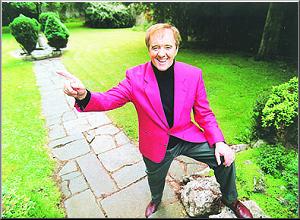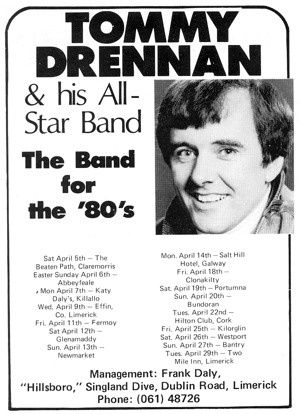Tommy: Monarch of all that he surveys
By Jimmy Woulfe

Tommy Drennan
SOCIAL taboos of the 1960s and 70s were cast aside in the heaving ballrooms of Ireland. Young men would marshal into a phalanx on one side of the ice-rink like dance floor. The bandleader's announcement: "Next dance, Please", triggered a buffalo charge in which girls were grabbed as though garments at the a new year sale. That raucous diversion will never be forgotten by those who wandered through those sweaty nights.
The showbands were in their heyday and out of Limerick the mellifluous voice of Tommy Drennan helped The Monarchs become one of the biggest crowd pullers in the land. Brendan Bowyer, Dickie Rock, Tommy Drennan and a few other lead singers had celebrity status. Tommy is still a professional singer, but these days he works the more mellow cabaret and corporate scene.
Tommy Drennan was born and reared at 21, O'Donoghue Avenue Janesboro and started school in the Presentation Convent before moving to CBS in Sexton Street. "There was a very strong music culture in the school where Br Mahedy and Br O'Shea produced many shows. They used to show films in the hall and before the film would start I might be asked to sing a song or two. I would have been about 10 at the time. I joined the Redemptorist choir up in the Fathers when I was 11 as a boy soprano."
A recording at that time at Mount St Alphonsus Church was later to help Tommy make number one in the charts with his greatest hit, O Holy Night. Tommy recalled: "Every Christmas there was a recital given by the choir from the altar. Fr John Torney was the choir master and he used to make tapes on an old Grundig tape recorder. He made quite a lot of recordings and he gave me a tape of myself singing O Holy Night. I took it home and put it into an old suitcase where it remained for years."
Years later in 1972 when Tommy and his band, The Monarchs, were travelling home to Limerick in the small hours after a dance in the North of Ireland, they listened on the radio to a well known jazz singer. The particular record was made up of two separate recordings, one when the singer was very young, and the other recent.
"I was chatting to Bryan Meehan and Jim Cannily in the van and told them about this tape I had from years before which was recorded in the Fathers. I said we could do something similar. "Castleconnell Hall was a huge venue and a few days later we were due to play there during a festival. I brought along the old tape and Ray Heraty brought along his recording equipment before the gig and we did the second verse of O Holy Night and joined it to the first verse recorded in 1953 when I was 11.
"We sent it off the EMI in Dublin who we were recording with at the time and they were knocked out by it. They did a recording in Dublin with an orchestra of the second verse and then amalgamated it with the 1953 recording." It went straight to number one at Christmas 1972, outselling the Beatles. It remained at number one for five weeks. Ever since it is widely played on radio stations around the county, particularly at Christmas. O Holy Night was Tommy Drennan's and The Monarchs single biggest hit.
Before going on the road with showbands, Tommy joined the Gilbert & Sullivan and Limerick Operatic societies in Limerick. "Tom Henn, who lives in Marian Avenue, was one of the main movers behind the Gilbert & Sullivan Society. There was also Peter Quinn, who worked with a travel agency office and his wife, Maisie, who played the piano. When I was studying for my Leaving Cert I had a part in The Mikado.
"At the time I was studying singing with Mrs Baker at 50, O'Connell Street. A man named Denis Nobel used come to Limerick from the Royal Irish Academy of Music and was a very trained singer. I was interested in classical singing and had won lots of medals at Feile Luimni and various Feis Cheoil. But when he stopped coming to Limerick I decided to move to Limerick to attend the academy of music as singing was all I wanted."
Tommy was working with a Shannon travel agency and got a transfer to Dublin to facilitate his desire to pursue his singing instruction. While in Dublin he received an invitation from UTV in 1962 to appear on a programme called Teatime with Tommy. "The host was Tommy James and he played the piano. It was a guest request show." At the time The Freshmen were looking out for a lead singer.
"Their lead singer, Derek Dean had decided to return to college to complete his studies to become a teacher. Somebody had seen me on the UTV show and made contact and asked if I would join the band. The showbands were huge at the time, so I decided to hit the road with The Freshmen in 1963 and remained with them for about a year. Billy Browne was with them at the time and the others included Sean Mahon, Davey McKnight and Damien McElroy.
"The musical scene that I had been in up to them was very proper and staid. So being with a top showband all of a sudden was very exciting and a total culture shock. We could work four or five weeks without a day off. The marquees were operating all over the country." Ironically, Tommy left the band after a dispute in the band van while they were travelling through Limerick to Cork. "We had come from Belfast and we were on our way to Crosshaven. I was engaged to Alice Dillon who was working in the Limerick Leader. I asked the lads to pull up for a while so I could meet her, but they wouldn't and out near the Regional Hospital, I insisted that the van stop. I got out and that was the end of it."
Jim Connolly, who now heads the rural re-settlement project in Clare, heard that Tommy had left The Freshmen and called to the family home in Janesboro. "This was early 1964 and Jim had formed The Monarchs with Ray Heraty, Bryan Meehan and Frank Hogan. They used to play in the local rugby clubs." Tommy Drennan and The Monarchs were one of the top Irish showbands during the next eight years, drawing thousands every night to halls and marquees all over the country.
There were a number of ballroom cartels who controlled most of the venues, and one group was run by former Taoiseach, Albert Reynolds, and his brother, Jim. Their ballrooms included the Jetland in Limerick. Another big ballroom group was run by the late Donie Collins from Askeaton. Like all other bands at the time, The Monarchs had to leave for England during Lent when most ballrooms closed down. "We did the Irish dancehalls in Manchester, Birmingham, Liverpool and London. And then in the middle of the week we worked the working men's clubs in the north of England in places like Hartlepool and the mining towns in Yorkshire. I found them extraordinarily fine people. And I used say if I weren't living in living in Limerick, I would gladly live in Yorkshire.
"There was a huge amount of road travel, but we were young. We spent a lot of time in the van playing cards. We were great at 45 and Lives. John "The Man" Frawley was great at Lives. "Brendan Bowyer started a trend with The Royal where he would do all the big numbers during the gig and another singer would do the rock 'n roll stuff. In The Monarch's. John Frawley was our Elvis Presley singer and I then took on the high note stuff. " The band's big hits included O Holy Night, Boolavogue, The Promise and the Dream and Love is a Beautiful Song.
Halls and marquees had precarious electricity systems which often weren't up to the high voltage demands of the electrified equipment of the showbands. "I recall one St Patrick's night in a marquee when the electricity went--they drove a car into the middle of the dance area and parked it with lights on to allow the dance to proceed. Fortunately we had a fine accordion player, Gerry Fitzgibbon from Adare So we were able continue with Gerry on accordion, Davy McCormack on trumpet, and the drums. And as there was no microphone during the black-out all seven of us in the band would shout out: 'Your next dance please.'"
But another problem arose when a crowd formed near the stage calling on Tommy to sing Little Boy Lost which was a big hit for them at the time. "All I could do was kneel down on the edge of the stage and sing to those who could hear me. Those at the back of the hall hadn't a clue what was going on." The Monarchs drew particularly big crowds in Wexford, partly due to the success of their hit Boolavogue.
"We could play in County Wexford for a whole week and get packed houses every night. I remember one Sunday night in Adamstown we had over 4,000 in the massive hall there. "At the time Ireland was a single nation as far as radio was concerned. If you got a record played on Radio Eireann it was heard all over the country, in every town and village. If you had a play on radio, you were listened from Donegal to Dingle, unlike nowadays with so many stations. And the success of the band business was the way it could get this blanket coverage throughout the country."
In 1972, Tommy formed his own band, Top League, and four years later he decided to concentrate on the local cabaret scene, where he still presides to this day. P.S. Editor's note from irish-showband.com note: Actually, Tommy was still on the road doing the major ballrooms as "Tommy Drennan and his All-Star Band" well into the
1980's, as shown in this advert which appeared in the "Entertainment News" magazine in April, 1980. BACK
| 